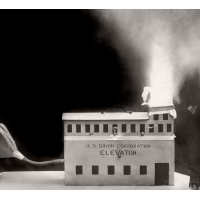Home » Jazz Articles » George Coleman
Jazz Articles about George Coleman
George Coleman: Live At Smalls Jazz Club

by Jack Bowers
Tenor saxophonist George Coleman, one week past his eighty-seventh birthday when Live at Smalls Jazz Club was recorded in March 2022, has not yielded an inch to Father Time, skating up and down his horn with the awareness and agility of someone many years his junior. It is entirely appropriate that this album should be a part of the Smalls Living Legend series, as Coleman easily qualifies for that honor. Before appraising the music, a brief side ...
Continue ReadingGeorge Coleman: Live At Smalls Jazz Club

by Pierre Giroux
If you are an aficionado of tenor saxophonists with a big, bold, biting tone who can run changes in the blink of an eye, then George Coleman is your man. Now in his 88th year, over the course of his long career, he has had a gamut of experiences including B.B. King (1952/1955-56), Max Roach (1958-59), Slide Hampton (1959-61) and Miles Davis (1963-64). His discography both as a leader/co-leader as well as a sideman covers a panoply of well-known jazz ...
Continue ReadingShirley Scott: Queen Talk: Live At The Left Bank

by Pierre Giroux
Queen Talk is a fitting title for the current release from the archivist label Reel to Real Records as Hammond B-3 organist Shirley Scott had the soubriquet “Queen of the organ" at the height of her career. This limited-edition hand-numbered 180 gram 2-LP set produced by Zev Feldman and Cory Weeds presents a never-before-released live 1972 recording from the Famous Ballroom in Baltimore. Other heavyweights on this outline are tenor saxophonist George Coleman, drummer Bobby Durham and, for three tracks, ...
Continue ReadingSmoke Celebrates 10th Annual Coltrane Festival with George Coleman / Eric Alexander Quintet

by Nick Catalano
Four months after opening their new expanded room, Smoke Jazz & Supper Club co-owners Paul Stache and wife Molly Sparrow Johnson reinstituted their annual Coltrane festival with a show dubbed “Countdown 2023." Fittingly, the festival opening featured 87 year-old tenor legend and frequent headliner George Coleman together with saxophonist Eric Alexander and drummer Joe Farnsworth--members of the One For All group that helped establish Smoke as the iconic club that it has become. Originally opened in 1999, Smoke, ...
Continue ReadingGeorge Coleman: An Alternative Top Ten Albums

by Chris May
Born in Memphis, Tennessee, saxophonist George Coleman cut his teeth in local rhythm and blues bands and made his first recording, aged twenty, with B.B. King in 1955. That year he switched from alto to tenor, because King already had an alto player; but Coleman has continued to play the alto from time to time and, on a few occasions, the soprano, too. By 1957, after being spotted and recruited by drummer Max Roach, Coleman had arrived in New York ...
Continue ReadingGeorge Coleman: The Quiet Giant

by R.J. DeLuke
This interview was first published at All About Jazz on March 13, 2004. The tenor sax is one of the great emblems of jazz. From Coleman Hawkins to Lester Young. Byas and Ben Webster. Dexter, Trane. Getz and Sonny Rollins, on and on. And today's practitioners like Branford and Brecker, Joshua Redman and James Carter. Hundreds in between, and there among the many lies the immensely talented George Coleman. We've all enjoyed his fine work, but ...
Continue ReadingCooking with Coleman

by Patrick Burnette
In honor of a Record Store Day release of In Baltimore, we decided to devote an episode to tenor saxophonist George Coleman, who served tours of duty with Max Roach, Elvin Jones, and Miles Davis among others. The focus is on his mid-sixties to early seventies work as we ponder George's strengths and weaknesses and whether he's been given a fair shake in jazz history. Pop matters touches on several groups and then wanders over into a discussion of jazz ...
Continue Reading


















